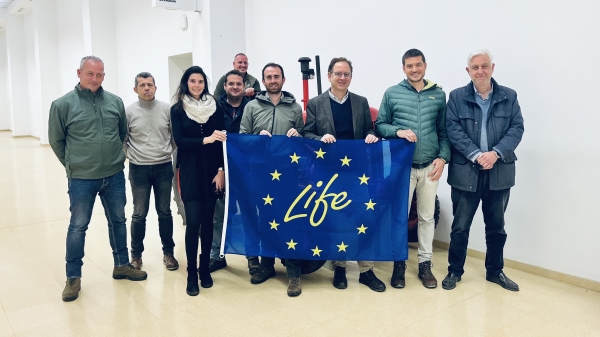A European consortium led by the University of Córdoba is working on a low-emissions certification for cereals like wheat and barley. This initiative could benefit farmers using sustainable practices and help reduce agriculture’s carbon footprint, which still accounts for 10% of greenhouse gas emissions (GHG) in the European Union.
Cereals are a strategic resource for Europe, which produces more than 250 million tons annually. In addition, they are used to make a wide range of products, such as bread, pasta, and beer. Relying on supplies from other countries, like Ukraine or the U.S., could pose a risk to Europe. However, the need to maximize production can clash with the European Green Deal and the climate goals of the 2030 Agenda if not managed responsibly.
Cereal production in Europe still has a significant carbon footprint. This environmental impact could be reduced with more sustainable farming practices—but this requires scientific evidence to identify which methods effectively lower emissions.
Sustainability can be an ambiguous term without clear ways to assess it. That’s why, Emilio J. González Sánchez, coordinator of the LIFE Innocereal EU project and professor of Agroforestry Engineering at ETSIAM–University of Córdoba, stresses: "Through this project, we aim to establish a certification so that farmers who implement good practices are recognized by the value chain."
To achieve this, the LIFE Innocereal EU project has developed a manual of best management practices (BMPs) and has launched several pilot farms in Portugal, Italy, Greece, and Spain—one of them on the Rabanales campus of the University of Córdoba.
Sustainable agricultural practices, like the ones in this manual, add value and therefore increase the final market price of the product. However, the benefits of this markup rarely reach the farmer. The aim of this project is to create a reference framework—the Low Emissions Certified Cereal (CCBE)—so that these practices are acknowledged at every stage of the value chain, including farming.
"When Pastas Gallo buys wheat to make pasta," González explains, "if that cereal comes certified by LIFE Innocereal, it should fetch a premium compared to non-certified grain." He adds, "In other words, farmers should be financially rewarded for their good practices."
A Promising Strategy to Withstand Drought
Project results have been influenced by a drought in recent seasons that severely affected conventional farms, leaving them with almost no yield. On the pilot farms, although yields were also low, production was 17% higher on average, and carbon emissions were reduced by 6.6%.
Moreover, costs were lower and water availability was higher—suggesting that these practices could be valuable assets during drought conditions.
In conventional farming, soil is tilled before planting to eliminate competition from other plants. This leaves bare rows between crops, making soil more vulnerable to drought and erosion.
Conservation agriculture, by contrast, advises against tilling, promotes crop rotation, and recommends direct seeding into the remains of the previous crop, keeping the soil covered and protected year-round.
This technique improves soil quality and allows water to infiltrate and be used more efficiently. It is also less risky, as tilling is not required, which significantly reduces pre-planting costs. “It’s a more conservative strategy from an economic standpoint,” says the researcher.
To cut costs, precision techniques—like using sensors to selectively apply herbicides or controlling pests via satellite—have also yielded positive results.
Despite these advantages, the use of sustainable practices remains uneven. Barriers such as lack of training, the need to adapt machinery, or the demand for more meticulous crop monitoring still cause hesitation among some farmers.
The project, now entering its final phase, is part of the European Union's LIFE program for environment and climate action, and it also has the support of industry representatives like Cuétara, Gallo, Intermalta, and SIP, as well as associations and research centers focused on conservation agriculture and organic production, such as IFAPA, Greenfield, Agrifood, and the Spanish Association for Conservation Agriculture and Living Soils (AEACSV).


